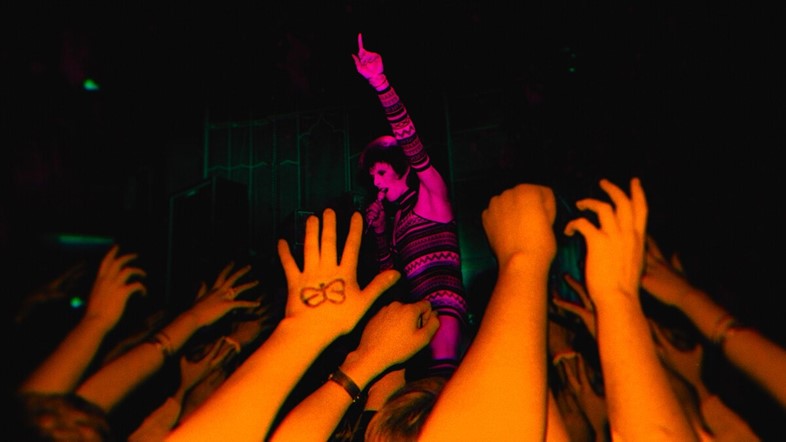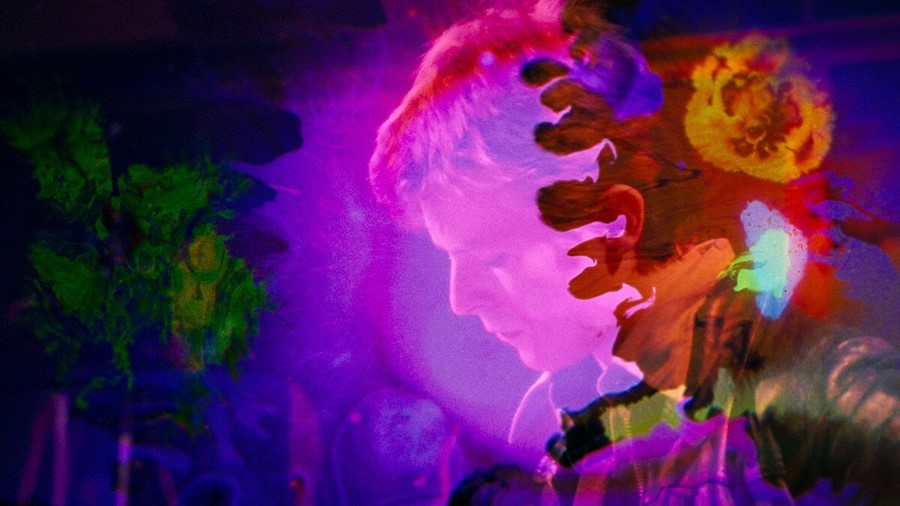The director of Moonage Daydream, Brett Morgen, talks about tackling one of the most scrutinised musicians from a different angle – a man who “could hear things that we couldn’t hear, and see things that we couldn’t see”
“Moonage Daydream is not about David Jones or David Bowie, it’s about ‘Bowie’ in quotation,” says director Brett Morgen about his new documentary, which doesn’t seek to figure out the man behind the British rock icon, but to tap into the essence of the myth he created. I’m sitting with Morgen in a room of the Hotel Thermal festival complex, a concrete Brutalist building in the Czech Republic where the Karlovy Vary International Film Festival is held, and where the film screened the night before. The late evening slot, with the packed cinema hall in party mood, felt right for immersion in a densely layered, kaleidoscopic and bombastic work that drenches all moments in Bowie’s sound, preferencing maximalist swagger over a dry chronology of facts.
A conventional biopic was not needed of a man who has had multiple books written about his life, and Morgen says he was grateful this freed him to make something experiential, “more like a poem,” with songs that “all resonate with the theme of transience.” While Bowie, who died in 2016, has a reputation as the ultimate shapeshifter, a musical innovator and style icon who reinvented himself through distinctive artistic periods, Morgen sees him as more than a consummate manifester of trends. “I didn’t really buy into that,” he said of Bowie’s numerous alter-egos, such as Halloween Jack and the Thin White Duke, seeing the characters as no more substantial than “various states of drug use.”

Morgen came, as he sorted through masses of material in Bowie’s estate, to appreciate the star as someone able to embrace change on a deeper, spiritual level, and navigate the anxiety and chaos of our times. “He was a 21st-century prophet. He was very attuned, and could hear things that we couldn’t hear, and see things that we couldn’t see,” he says. “The movie was edited during the pandemic, and speaks to what we are going through, in terms of how to be creative during periods of isolation and alienation,” the director adds. “We are living in a digital world inundated with information, and David was talking about this before there was the internet. And the issues that have risen to the forefront of mainstream culture finally after 50 years with gender fluidity, he was talking about 50 years ago.”
Morgen has long been interested in modern-day civilisation’s myths, and Moonage Daydream is not his first documentary about a music legend. His critically acclaimed Kurt Cobain: Montage of Heck (2015) offered an intimate view into the inner world of the ultimate grunge icon, using a comparable assemblage approach to the Nirvana frontman’s diaries, drawings and home videos. Cobain’s premature death at age 27 meant fan mythology around him had reached epic proportions by the time Morgen was tasked with distilling something approaching authentic truth from these material traces – and with access to Bowie’s estate, the director grappled again with the sheer scale of a fabled personality. But this did not phase him. “It’s critical not to be intimidated by either the subject or the amount of material,” he says. “I describe it as a murder scene,” he said of the process, in that some raw material naturally stands out, as if dye were applied to reveal blood.
Still, what was slated as a 68-week production ended up taking five years. The freedom to work until he feels truly done is essential to Morgen – something he learned the hard way, when he did not have final cut on Crossfire Hurricane (2012), his film on the Rolling Stones. “I decided I would never under any circumstances do that again,” he says. “When a film comes out and isn’t ready, it becomes a product.”
The pandemic was not the only unforeseen event impacting the production of Moonage Daydream, as Morgen had a heart attack, flatlined and was resuscitated, while making it. Had this not happened, a different, “less philosophical” film would have emerged, he said. “I don’t mean this to sound self-centred, but I do view all biography as a form of autobiography. I’m just using these subject matters to explore parts of myself that I’m interested in.”
When he started making the film, Morgen was “a casual fan at best” of Bowie, but by the end he saw him as holding the existential answers he needed. “I don’t have the wisdom that David has, so I wanted to use his words and philosophies to provide my children with a guide to how they can live a fulfilled, satisfied life in the 21st century,” he said. “He knew how to live, and took advantage of all the life offered. The way he is able to articulate the necessity to break out of our comfort zone so that every day can be an opportunity for growth, should be inspiring to anyone.”
Moonage Daydream is in Imax from September 16 and in cinemas from September 23.
